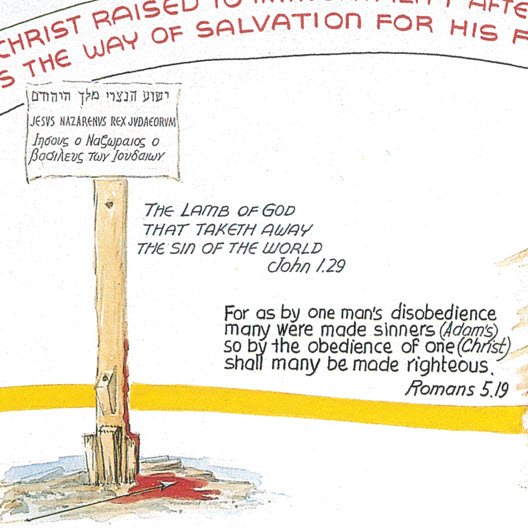The Meaning of Christ’s Sacrifice
God Sent Jesus to Save Repentant Sinners
In his great love, God prepared and sent Jesus specifically for the purpose of being a sacrifice to save sinful mankind. He was sent to be our representative as a mortal man with the same mortal sinful nature as us, but was able to overcome sin because he was also the Son of God and was strengthened by God. God was in Christ reconciling the world unto him.
Christ’s Sacrifice is to Demonstrate God’s Righteousness
The blood of Christ shed in his sacrifice was a deliberate and public demonstration by God of the principles of God's righteousness and the condemnation of sin in mortal sinful flesh that we can have faith in. Jesus' sacrificial death was only able to demonstrate God's righteousness and the condemnation of sin because he was perfectly righteous and sinless in his life.
The sacrifice of Christ enabled God to be gracious and merciful to save mankind without any compromise of his righteousness or justice. This is by his grace and forbearance that he might be just while justifying the unjust. God was righteous to send Jesus to die as a sacrifice but was also righteous in raising him from the dead to immortality. Salvation through Christ is only possible because God raised him from the dead, thus obtaining victory over sin and death in him. His grace and goodness is to lead us to repentance.
Christ’s Sacrifice is Efficacious to Save By Faith
God's will is that salvation from sin and death for mortal mankind is only available on the basis of faith in, and identification with, the principles of God's righteousness and the condemnation of sin as demonstrated in the sacrifice of Jesus.
The blood of Christ is efficacious to save by faith. The shedding of Christ's blood does not meet any legal requirement or perform any function or transaction. It is God who forgives sins and delivers from mortal sinful nature in his love and forbearance. He does so on the basis of our faith in the principles of God's righteousness and the condemnation of sin that the sacrificial shedding of Christ’s blood demonstrates.
It is God who saves us by his grace through our faith in the principles of his righteousness and the condemnation of sin demonstrated in the sacrifice of Christ. We identify in faith with his blood by being baptised and living the principles of his sacrifice and resurrection in a life of faith. Every aspect of the sacrifice and resurrection of Christ teaches us moral principles to live by. God imputes righteousness to us because of our faith, “the just shall live by faith” Romans 1:17.
By our faith in the principles demonstrated in the shedding of Christ's blood, God will;
Forgive us our sins and make us his righteousness
Transform our minds by his Word so that by faith we are dead to sin and alive to righteousness
Raise us from the dead and deliver us from mortality by changing our bodies to be immortal
Christ Was Saved Through His Own Sacrifice
As our representative Jesus was himself redeemed and saved from mortality through his own blood. God redeemed and raised Jesus from the dead to immortality because of his faith in his blood. In his life of perfect righteousness and obedience, Jesus exhibited his faith in the principles of God's righteousness and the condemnation of sin demonstrated in the sacrificial shedding of his blood. Jesus needed no forgiveness because he committed no sin, but he did need saving from mortality.
As our representative, Jesus obtained salvation through his own blood for himself for the purpose of obtaining it for us. He was the first to obtain salvation and has opened the way for us to also obtain salvation through him.

